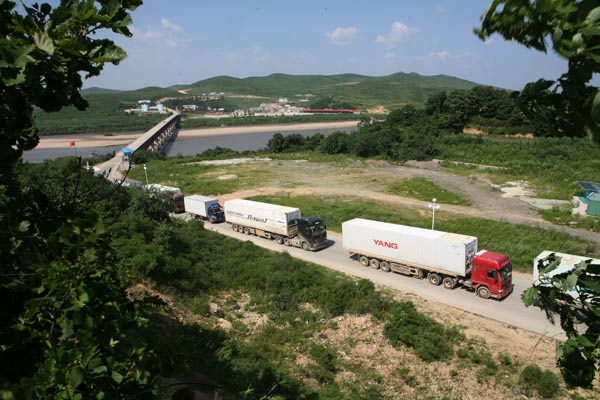Stronger links show countries mean business
Updated: 2012-09-21 07:32
By Wu Yong and Liu Mingtai (China Daily)
|
|||||||||||
China and the DPRK explore greater opportunities, Wu Yong and Liu Mingtai report from Jilin.
Zhao Denan is obsessed with the economic and trade trends between China and the Democratic People's Republic of Korea.
The businessman - from Hunchun, Jilin province, which borders the DPRK - is the general manager of a large logistics company that operates China's only freight route to incorporate the port of Rason in the DPRK. The route runs from northeastern China to Shanghai.
 |
|
Trucks cross the Tumen River to China's Jilin province, as Sino-DPRK trade expands. Provided to China Daily |
Hunchun, located in Jilin's northeastern sector, is the only Chinese city that borders both the DPRK and Russia. It has four trading ports with the two countries.
"Our route equals at least 1,400 km of transport by rail. Can you imagine the size of the market? We are talking about limited rail capacity and a tight coal supply in southern China during the winter," said Zhao, his eyes shining and his voice unconsciously high pitched.
Zhao's company, Hunchun Chuangli Logistics Co, started operations in 2011 and by the end of May had shipped 104,531 metric tons of coal to Shanghai via Rason. Now, the cross-border transport link has been recognized as a major part of a new-look economic relationship between China and the DPRK.
The countries share a border of 1,334 km. Chinese investment in the DPRK rose to $300 million in 2011 from $50 million in 2004, and it is still rising, according to Jin Meihua, a researcher at the Northeast Asia Studies Institute at Jilin Academy of Social Sciences.
Lu Chao, a specialist in Korean Peninsula Studies at Liaoning Academy of Social Sciences, said the bilateral trade volume has doubled during the past two years.
The last market
A businessman from Shenyang, who would only give his surname as Zeng, has made many trips to the DPRK in search of opportunities in the retail business in Pyongyang.
"This may be the last market left to explore, so you can imagine the opportunities," he said.
In addition to the enthusiasm shown by the Chinese business community, the DPRK has other reasons to reinvigorate its economic cooperation with China. The United Nations imposed sanctions on the country after a nuclear test in 2006 and then strengthened them after a second test in 2009. Western countries have severed economic ties.
In response, the DPRK began to reform its planned economy in 2007. Zhang Huizhi, a professor at the Center for Northeast Asian Studies at Jilin University, said that economic issues provided the theme for the DPRK's annual New Year editorial in 2010 and 2011, reflecting the government's desire to make improvements.
One of the most important steps in the reform process was the amendment of laws relating to the status of the Rason Economic and Trade Zone, the establishment of an international investment vehicle, called the State Development Bank, and the Commission for Joint Ventures and Investment.
In June 2011, Beijing and Pyongyang laid the foundations of RETZ and the Hwanggumphyong and Wihwa Islands Economic Zone. A joint steering committee for the development and management of the zones was announced in August.
The new Kim Jong-un administration in Pyongyang places great importance on economic cooperation with China, said Zhang.
Seo Gil-bok, the DPRK vice-minister of commerce, called for further cooperation with China to "achieve common development and prosperity under the principle of mutual benefit" at the Eighth Northeast Asia Investment and Trade Expo, held earlier this month in Changchun, capital of Jilin province.
"Given the challenges facing Sino-DPRK economic relations, the two neighbors need to explore new modes of cooperation to further promote and consolidate bilateral political and economic relations," said Jin.
Related Stories
DPRK's economic zone aspires for new development 2012-08-28 16:45
2012 China-DPRK Economic, Trade, Cultural and Tourism Expo holds news conference 2012-09-17 18:03
China-DPRK trade needs new model 2012-09-13 07:50
China, DPRK vow to develop economic zones 2012-08-17 21:49
Hu vows more cooperation with DPRK 2012-08-17 20:47
Today's Top News
President Xi confident in recovery from quake
H7N9 update: 104 cases, 21 deaths
Telecom workers restore links
Coal mine blast kills 18 in Jilin
Intl scholarship puts China on the map
More bird flu patients discharged
Gold loses sheen, but still a safe bet
US 'turns blind eye to human rights'
Hot Topics
Lunar probe , China growth forecasts, Emission rules get tougher, China seen through 'colored lens', International board,
Editor's Picks

|

|

|

|

|

|





